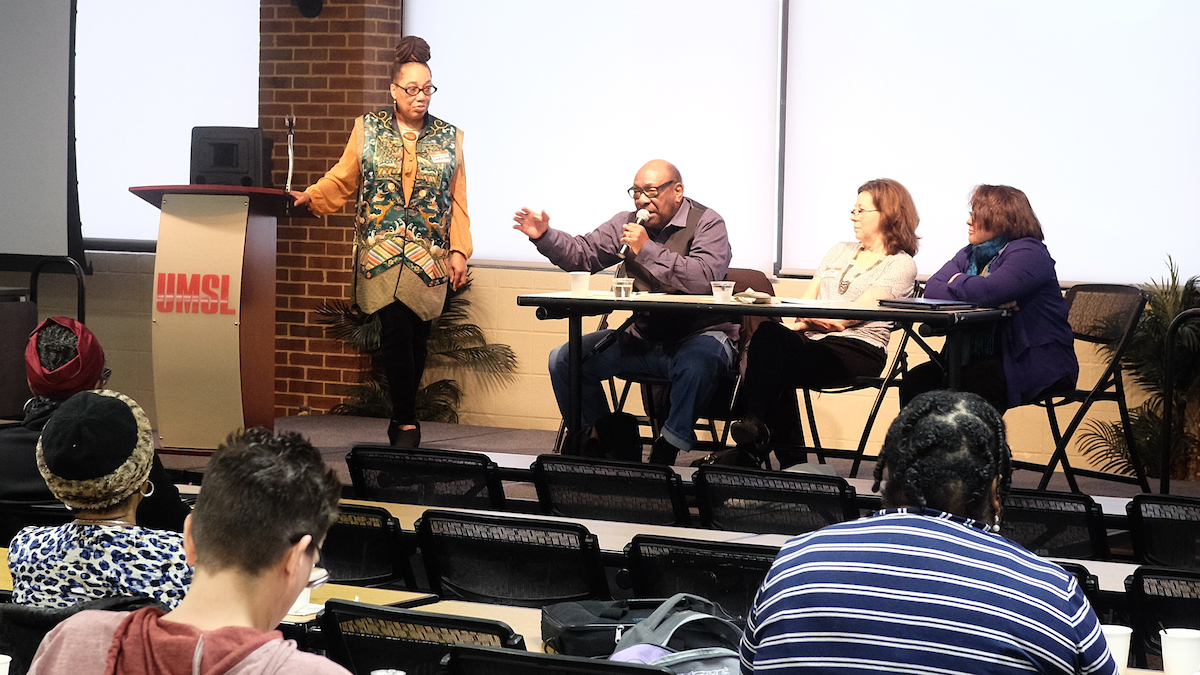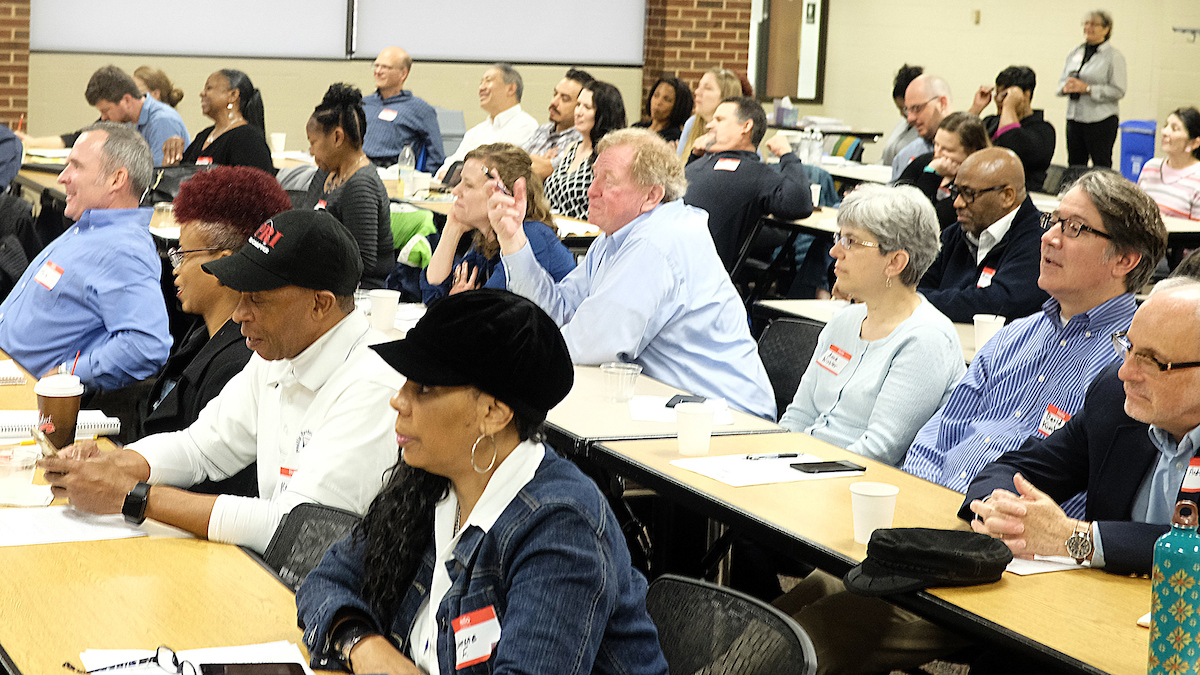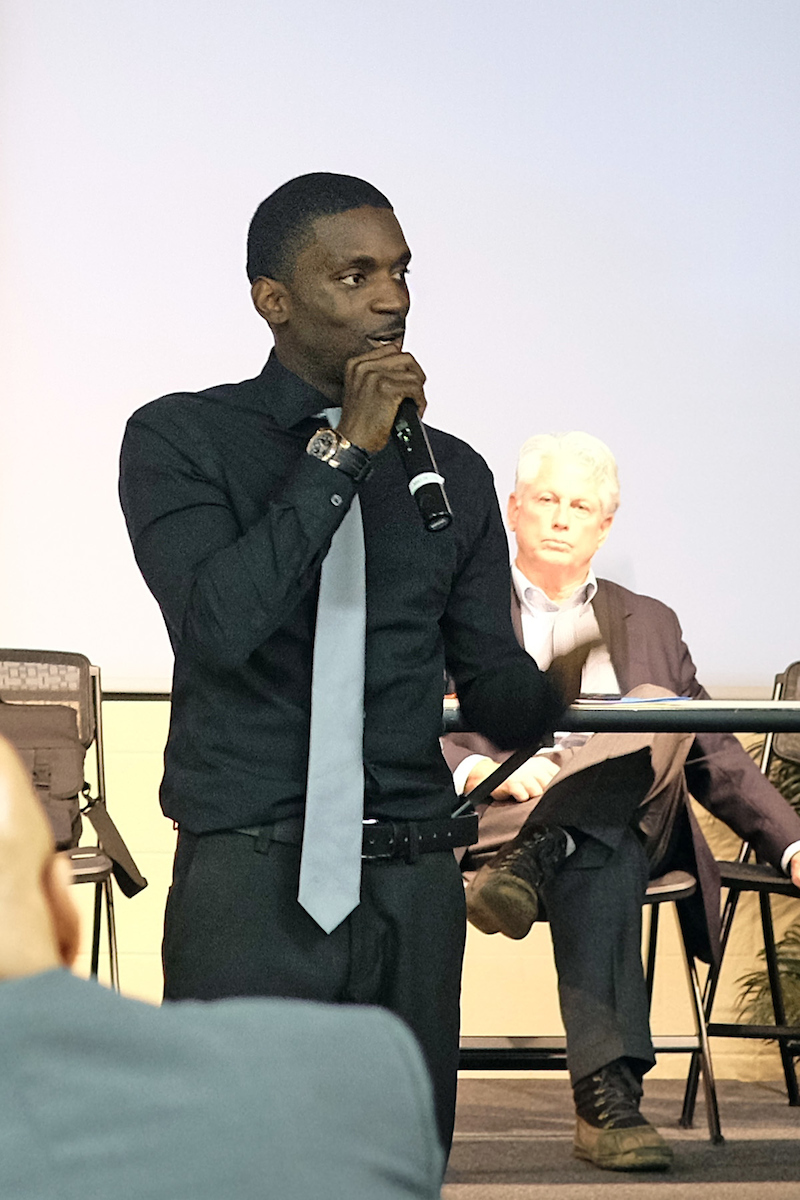
Percy Green II (second from left) answers a question from the audience during a conference titled “Civil Rights in Workers’ Lives” on Tuesday at the J.C. Penney Summit Lounge. Professor Priscilla Dowden-White (at left) moderated the panel with Green and Deborah Henry and Rosemary Feurer (far right). (Photos by Steve Walentik)
Percy Green II compared the history of individuals organizing and advocating on behalf of a cause, such as workers’ rights – civil rights – to the molecules that come together to form clouds.
Green famously in 1964 climbed a ladder at the Gateway Arch – then still under construction – to protest fair employment practices. Later, he brought a federal lawsuit against McDonnell Douglas Corporation and carried it to the Supreme Court, helping make it possible to prove discrimination in the workplace. And he’s taken action to push for equality in the St. Louis region for 50 years.
“Not every cloud that you see come together – the molecules that formulate a cloud – brings rain,” Green said as he spoke to an audience of students, faculty members and local labor organizers Tuesday morning during a conference titled “Civil Rights in Workers’ Lives” in the J.C. Penney Summit Lounge at the University of Missouri–St. Louis. “Just because you have a cluster of people that comes together … we would like to think that that will be a movement that will sustain itself, but there’s no guarantee.”
Douglas Swanson, who serves as the coordinator for labor studies at UMSL through a cooperation agreement with the College of Arts & Sciences and University of Missouri Extension, organized the event, bringing together speakers such as Green and labor historians Deborah Henry, a professor at St. Louis Community College–Forest Park, and Rosemary Feurer, associate professor at Northern Illinois University, to discuss the tactics and strategies groups have used to affect change on behalf of workers in the past century.

More than 130 people, including students and faculty members as well as labor and community members, attended the conference Tuesday in the J.C. Penney Summit Lounge.
Priscilla Dowden-White, an associate professor of history at UMSL, served as the moderator for that opening panel, which also delved into impediments some argue have slowed the rate of gains on behalf of workers in the past few decades, including today.
Those arguments come after a steady decline in union participation over the past 35 years.
“We have to get young people to understand that union is not a bad word, because a lot of them have misconceptions and a false education on this subject,” Henry said. “We have to help them understand that this is their life and that they’re creating tomorrow’s history that they’re going to live in it the rest of their lives. I think as folks who have been engaged over a while, we have to absolutely be there for them and be there with them so we can lift them up.”
Swanson wanted the conference to demonstrate the connection between workers’ rights and civil rights.
“When I do labor education I sometimes talk about how people self-identify with their issues, and how the issues can become utilized as tools to divide workers,” he said. “I look from a lens of labor, and either you’re a wage worker or you’re not. Everything else can end up being used as a wedge tool to divide workers from talking about their common interest if we are not careful. Whether I’m a person of immigrants or if I was native born, whether I’m white or black or brown, whether I’m male or female what we all have in common is that we workers and our differences shouldn’t be used to divide us. One of the goals of this conference was to look at how workers lives and the civil rights movements intersect and overlap.
“We all want to have a family-supportable job. We all want to have a job that brings dignity to the household. We want to be able to raise our families. We want to be able to have food on the table, a roof over our heads, health care, maybe some retirement savings. Those are things that we all have in common.”
But the idea for the event really grew out of an exhibit at the Missouri History Museum called “#1 in Civil Rights: The African American Freedom Struggle in St. Louis.”

Rep. Bruce Franks Jr. speaks about ways to find commonality between workers in urban and rural areas.
Gwen Moore, a 1969 UMSL graduate and who curated the exhibit in her role as curator of urban landscape and community identity at the museum, spoke during the first of two afternoon sessions Tuesday. She shared some of the history of the civil rights movement in St. Louis dating back to the mid-1800s with the Dred Scott decision and showed the labor issues at the heart of so much of it.
In the day’s final session, Pat Dolan, Missouri AFL-CIO apprenticeship coordinator, talked about the Building Union Diversity program created by the St. Louis Agency on Training and Employment in partnership with the St. Louis Building & Construction Trades Council. Among other things, it aims to address the historic lack of diversity in the building trades.
Bruce Franks Jr., representative from Missouri’s 78th House District, closed the session by sharing his approach for bridging the divide that seems to exist between workers in urban and rural areas.
Swanson said more than 130 people attended the conference.
He’d like to make it the first installment in an annual series that focuses on the changing nature of work and imagines future sessions on women in the workforce and immigrant issues as well as the gig economy.














